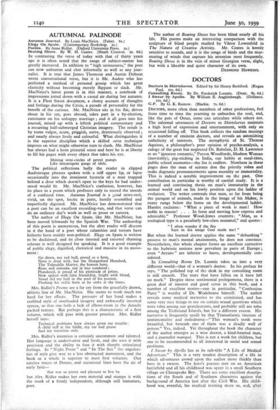AUTUMNAL PALINODE
IN contrasting the verse of today with that of thirty years ago it is often noted that the range of subject-matter has greatly increased. In addition to " high seriousness," the poet can now unbutton and chat informally as well as any jour- nalist. It is true that James Thomson and Austin Dobson wrote conversational verse, but it is Mr. Auden who has
perfected a method of personal gossip which has great elasticity without becoming merely flippant or slack. Mr. MacNeice's latest poem is in this manner, a notebook of impressions jotted down with a casual air during last autumn. It is a Fleet Street document, a chatty account of thoughts and feelings during the Crisis, a parade of personality for the benefit of the curious. Mr. MacNeice sits in his flat, drives about in his car, goes abroad, takes part in a by-election, ruminates on his unhappy marriage ; and it all goes into his journal, mixed up with a leftish political commentary and a recurring half-submerged Christian imagery. The result is by turns vulgar, acute, priggish, naïve, dexterously observed ; and nearly always lively and colourful. What distinguishes it is the superior discipline which a skilled verse technique imposes on what might otherwise turn to slush. Mr. MacNeice has always had a keen pictorial sense and here he is at liberty to fill his pages with every object that takes his eye.
Shining semi-circles of petrol pumps Like intransigent gangs of idols.
The political reflections bully the reader in clipped Audenesque phrases spoken with a stiff upper lip, or lapse occasionally into the imminent hysteria of a man trapped behind a door which doesn't open to the keys he had under- stood would fit. Mr. MacNeice's confusion, however, has its place in a poem which professes only to record the moods of a confused time. Autumn Journal is a wiod news-reel, vivid, on the spot, hectic in parts, hastily assembled and imperfectly digested. Mr. MacNeice has demonstrated that a poet can be an excellent recording-van, and that verse can do an ordinary day's work as well as prose or camera.
The author of Elegy On Spain, like Mr. MacNeice, has been moved leftwards by the Spanish War. The authorship of this poem is anonymous, but the alert reader will discern in it the hand of a poet whose calamities and terrors have hitherto been mainly non-political. Elegy on Spain is written to be declaimed, and its close internal and external rhyming scheme is well designed for speaking. It is a good example of public elegy, dignified, rhetorical and massive in its move-
ment : Go down, my red bull, proud as a hero,
Nero is done with, but the Hungerford Hundred, The Tolpuddle Martyr, the human hero,
Rises and remains, not in loss sundered ;
Plundered, is proud of his plenitude of prizes. Now spiked with false friendship, bright with blood, Stood did my bull in the pool of his passion, Flashing his sickle horn as he sinks at the knees.
Mrs. Ridler's Poems are a far cry from the gracefully drawn,
athletic line of Mr. MacNeice. She seems to work much too hard for her effects. The pressure of her hand makes a crabbed style of overloaded imagery and awkwardly inverted syntax, so that one feels a lack of elbow-room in the densely packed texture. But perhaps this is a characteristic of a first volume, which will pass with greater practice. Mrs. Ridler herself says:
Technical problems have always given me trouble: A child stiff at the fiddle, my ear had praise And my intention only.
Mrs. Ridler's intention is certainly uncommon and talented. Her language is underivative and fresh, and she uses it with precision and the ability to fuse it with sharply articulated feelings. In " Night Poem " and " In The Sea " the angulari- ties of style give way to a less obstructed movement, and the book as a whole is superior to most first volumes. One catches traces of Donne, and occasional lines have the air of
early lyric—
that was so pretty and pleasant to live by
but Mrs. Ridler makes her own material and stamps it with the mark of a firmly independent, although still immature,
poet.
The author of Beating Shoes has been blind nearly all his life. His poems make an interesting comparison with the sculpture of blind people studied by Viktor Lowenfeld in The Nature of Creative Activity. Mr. Coates is keenly sensitive to sounds, and it is the songs of birds and the mur- muring of winds that capture his attention most frequently. Beating Shoes is in the vein of minor Georgian verse, slight, but with a likeable and quiet character of its own.
DESMOND HAWIUNS.










































 Previous page
Previous page